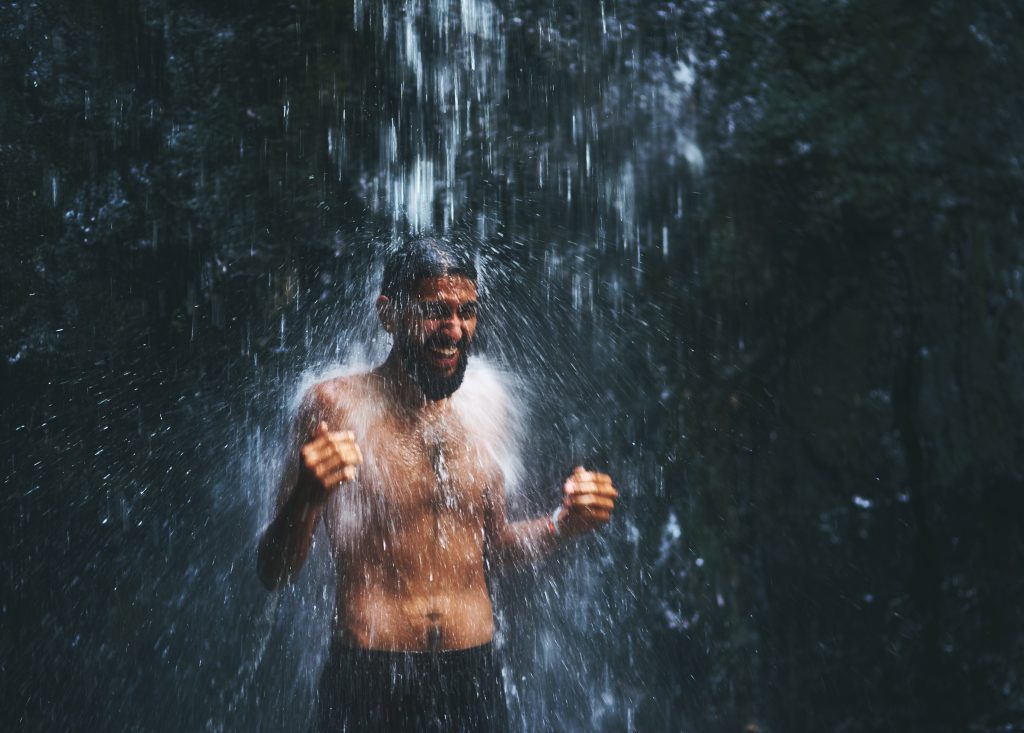A sudden plunge into icy water can be an intimidating experience. Your body goes on high alert which launches a range of survival mechanisms – for example, convulsively swallowing air and focusing your body’s energy towards vital organs. It is enough to make even the bravest among us shiver. These processes are followed by a short-term decrease in cognitive functions which puts you in some kind of a meditative state.
But why do all these things happen, and what is happening inside your body when you expose yourself to cold temperatures? Danish author and metabolic scientist Dr. Susanna Søberg explains this and more in her book ‘Winter Swimming: The Nordic Way Towards a Healthier and Happier Life’. Let’s find out what cold water therapy does to your hormones and your nervous systems.
What is cold water immersion?

Cold water immersion is a practice that involves submerging oneself into cold water (less than 15°C/59°F) as a form of therapy.
This type of hydrotherapy includes:
-
cold showering
-
ice baths and plunging
-
swimming in pools and natural reservoirs
Effects from the practices vary depending on the protocols used but, for most individuals, these could include reduced inflammation, improved recovery from physical activity or stress, improved well-being, increased metabolism, and an overall increase in pain threshold.
Activation of parasympathetic & sympathetic nervous systems

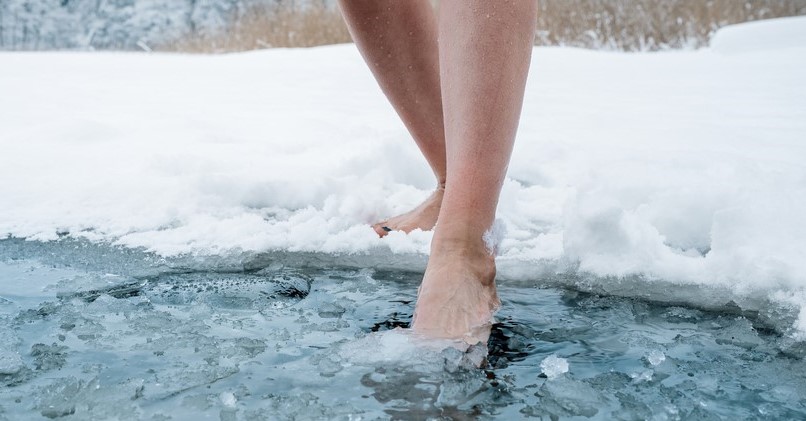
During the process of cold water immersion, our bodies activate two distinct nervous systems:
– the parasympathetic nervous system that helps us rest and recover
– the sympathetic nervous system which encourages alertness and strength
An effective interaction between these opposite forces can ensure we remain both physically and mentally balanced. People who practice cold water immersion by swimming or plunging experience hyperventilation, tachycardia, and trembling muscles upon initial immersion. Soon enough these effects are replaced by calming normalisation of breathing and reduced pulse rate. This change can be attributed to hydrostatic pressure which stimulates baroreceptors resulting in the inhibition of the sympathetic nervous system.
Cold water and hormonal boost

When your body is faced with a stressful situation such as getting into cold water, it works to stay alert by boosting metabolism and keeping blood warm. But this physiological response could have additional healing benefits: the surge of hormones like adrenaline, norepinephrine, cortisol, and endorphins can trigger neural signals to the brain resulting in positive emotions including happiness and contentment. Therefore there may be more than just physical advantages that come from being immersed in cold water – you might get an emotional boost too.
In her book, Dr. Søberg mentions a 2000 study which found that when exposed to warm or cold temperatures (between 20°C and 32°C) in the water, hormone activity was higher than normal – all thanks to humoral control mechanisms kicking in.
1Adrenaline: Feel powerful!
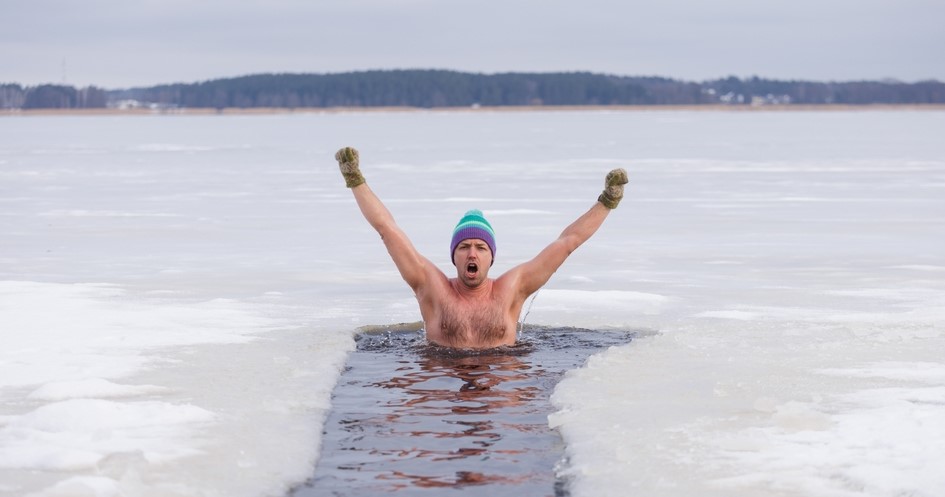
Adrenaline is the neurotransmitter that increases alertness. This hormone has multiple functions as it acts on cells throughout our bodies in order to save us when we are threatened. When faced with a dangerous situation like being in icy water, adrenaline triggers the release of glucose from the glycogen sources into your bloodstream so that you have energy available for fight or flight. Blood vessels expand and narrow simultaneously – making more glucose accessible while reducing insulin secretion which helps keep high levels of sugar in your system quickly – giving you all the power you need.
2Endorphins: Less pain
Cold water immersion increases the levels of β-endorphin, stimulating the sympathetic nervous system to provide a much-needed respite from mental distress. The release of endorphins in your brain is a powerful reward system. Endorphin neurotransmitters actually act as internal ‘drugs’ that improve mood and bring feelings of happiness, while also serving to reduce pain levels.
3Norepinephrine: Fastester metabolism
Norepinephrine is an essential neurotransmitter that helps to keep us alert and awake. It works in tandem with adrenaline to raise the heart rate and blood pressure. This powerful chemical also engages brown fat, enabling it to produce heat while increasing metabolism – particularly when exposed to cold temperatures.
Norepinephrine is synthesised in two distinct areas:
– the adrenal medulla (which primarily produces adrenaline)
– sympathetic nerve endings for additional norepinephrine production
Sympathetic nerve endings release norepinephrine into the bloodstream normally only in small amounts. However in times of heightened sympathetic activity – like getting into cold water – a substantial surge is released, resulting in much higher concentrations that can have bigger physiological consequences.
4Cortisol: Fight inflammation
Cortisol is a hormone that plays an integral role in stress relief: it boosts blood sugar levels, conserves energy for essential processes, and prepares muscles for action.
Those who practice cold water immersion may experience a surge in cortisol levels when braving icy waters. This is good news as the hormone has been found to have an anti-inflammatory effect on conditions like arthritis or atherosclerosis by quieting down the immune system’s inflammatory response.
5Dopamine: Alleviate depression
Unraveling the effects of dopamine could help explain why some people find cold water so incredibly pleasurable – and subsequently addictive. Research has already been conducted on rodents to examine how rapidly increased levels of this hormone can increase feelings of happiness, satisfaction, and pleasure in response to a cold shock stimulus.
According to Dr. Susanna Søberg, exposing yourself to a chilly 14°C of water can deliver an impressive 250% increase in dopamine levels, providing you with a feeling of well-being and satisfaction.
 Source: SpringerLinks
Source: SpringerLinks Imbalanced dopamine levels in the brain can cause a range of mental disorders, resulting in depression and addiction. Normally, when we feel good or experience success our brains release neurotransmitters that make us happy – but with fewer hormones present the feeling is much less tangible. Enhanced amounts produce pleasure; extremely high volumes lead to extreme joy which could explain why cold water enthusiasts report elevated moods after diving due to their bodies undergoing a ‘cold shock response’, triggering an increase of this hormone as a potential treatment for depressive states.
6Serotonin: Improve mood
Serotonin is an essential hormone that influences our emotions, thoughts, and behavior. It helps regulate everything from mood to appetite, memory formation, and more, making it a significant contributor to psychological well-being. It is also one of the products of the ‘cold shock’ reaction. Low levels of serotonin have been linked with depression, so giving your body the tools necessary for producing this important neurotransmitter can be beneficial in maintaining emotional balance.
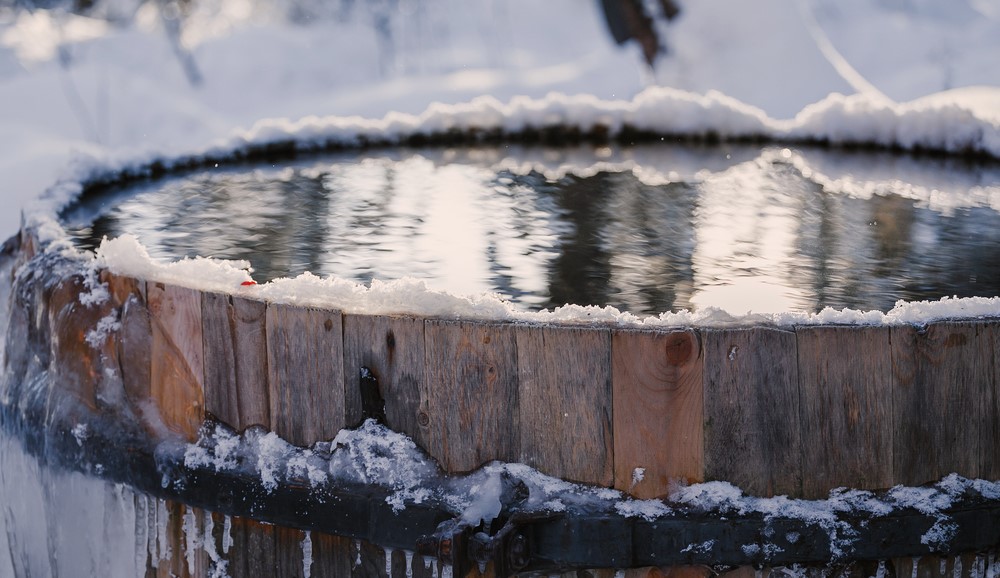
Disclaimer

If you have pre-existing problems with your heart health, we do not recommend getting into cold water right away. You might want to discuss it first with your doctor and start the practice slowly with a gradual temperature decline. According to the Royal Life Saving Society (UK), a sudden rise in blood pressure can be fatal for people with a pre-existing heart condition. Each year a number of people who are suspected of drowning, turn out to have had a heart attack.
Fun & interesting facts about cold water immersion
-
The Ancient Romans had cool pools in their bathing complex. The ‘cold room’ which contained them was known as the frigidarium.
-
Some people have an intense fear of cold. This condition is called cryophobia.
How does cold water Immersion activates your hormones?

Our bodies perceive cold water immersion as a stressful situation and that might be beneficial for those who practice it in a moderate and balanced way. The cold shock response activates your sympathetic nervous system and hydrostatic pressure turns on the opposite force – the parasympathetic system. Both work at the same time and make you feel a cocktail of emotions. Your hormones also get shaken up – a mix of adrenaline, epinephrine, endorphins, serotonin, cortisol, and dopamine makes you feel energised and relaxed at the same time. This is why practicing cold water immersion can change the way you feel on a daily basis and help you fight mental illnesses.
Hungry for knowledge? Here is more
If you want to learn more about the world of cold water immersion, we recommend you read the book ‘Winter Swimming: The Nordic Way Towards a Healthier and Happier Life’. Dr. Susanna Søberg, the author of the book, practices winter swimming herself. She interviewed people in her local swimming club and has done multiple studies on the subject.
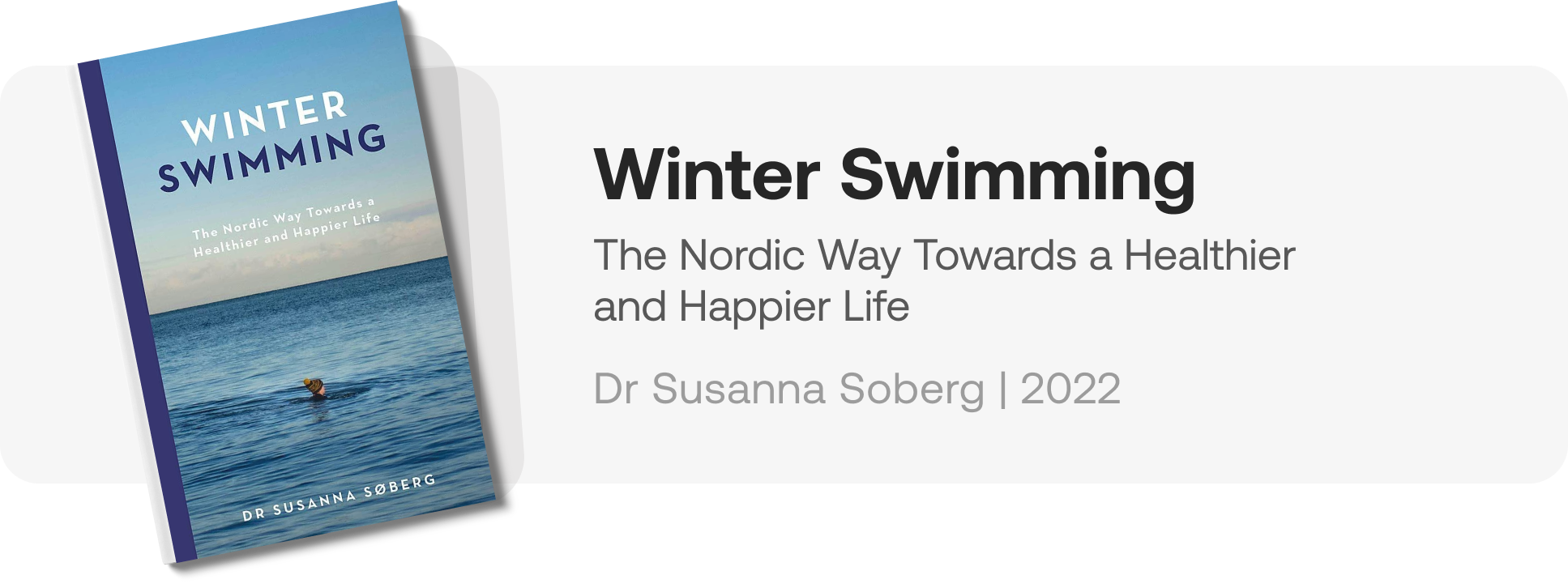
In this video neuroscientist, Dr. Andrew Huberman explains how deliberate cold exposure affects our bodies, how it is connected to the strength increase, and lists the best ways to reap the benefits from the practice.

